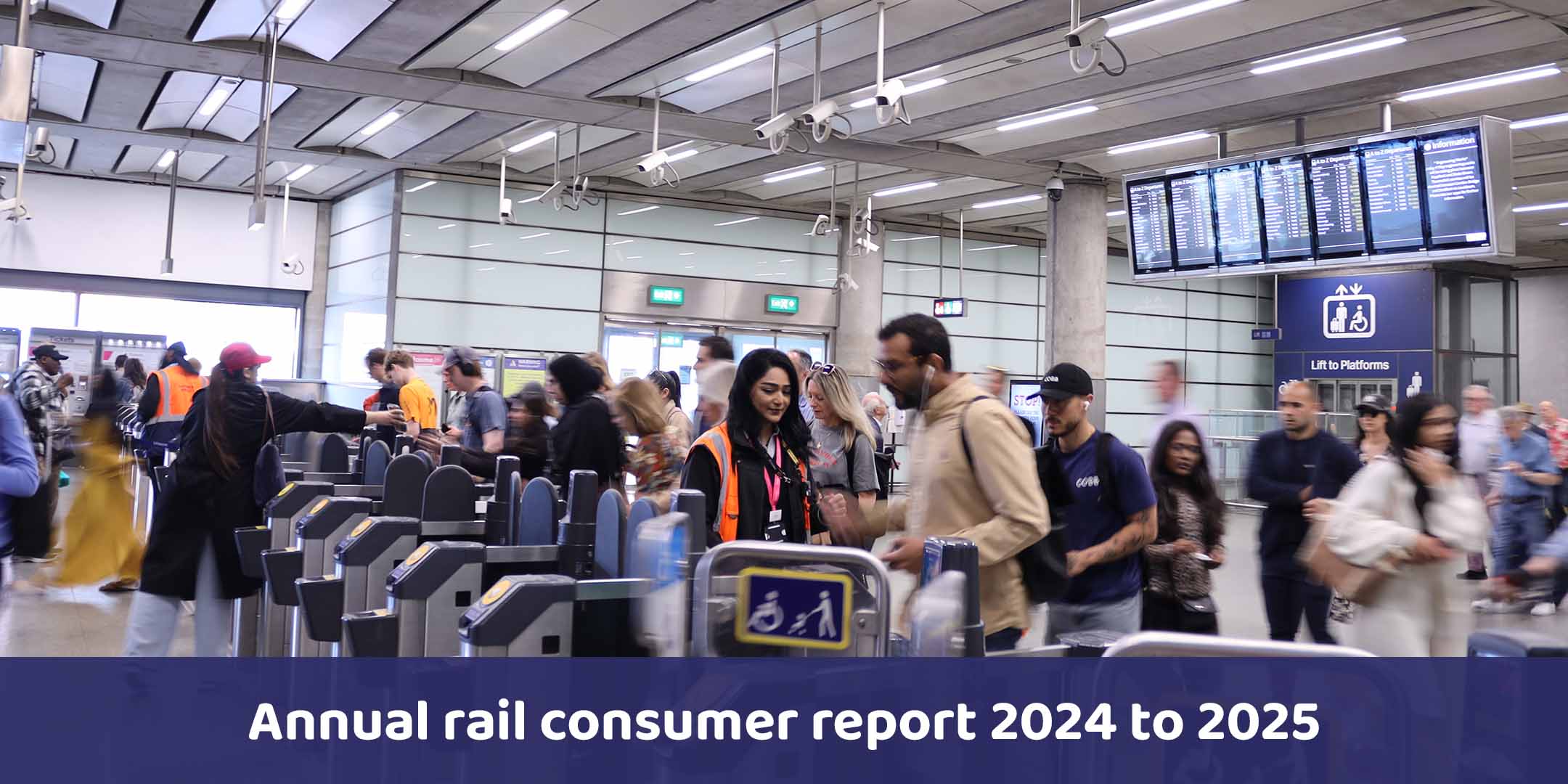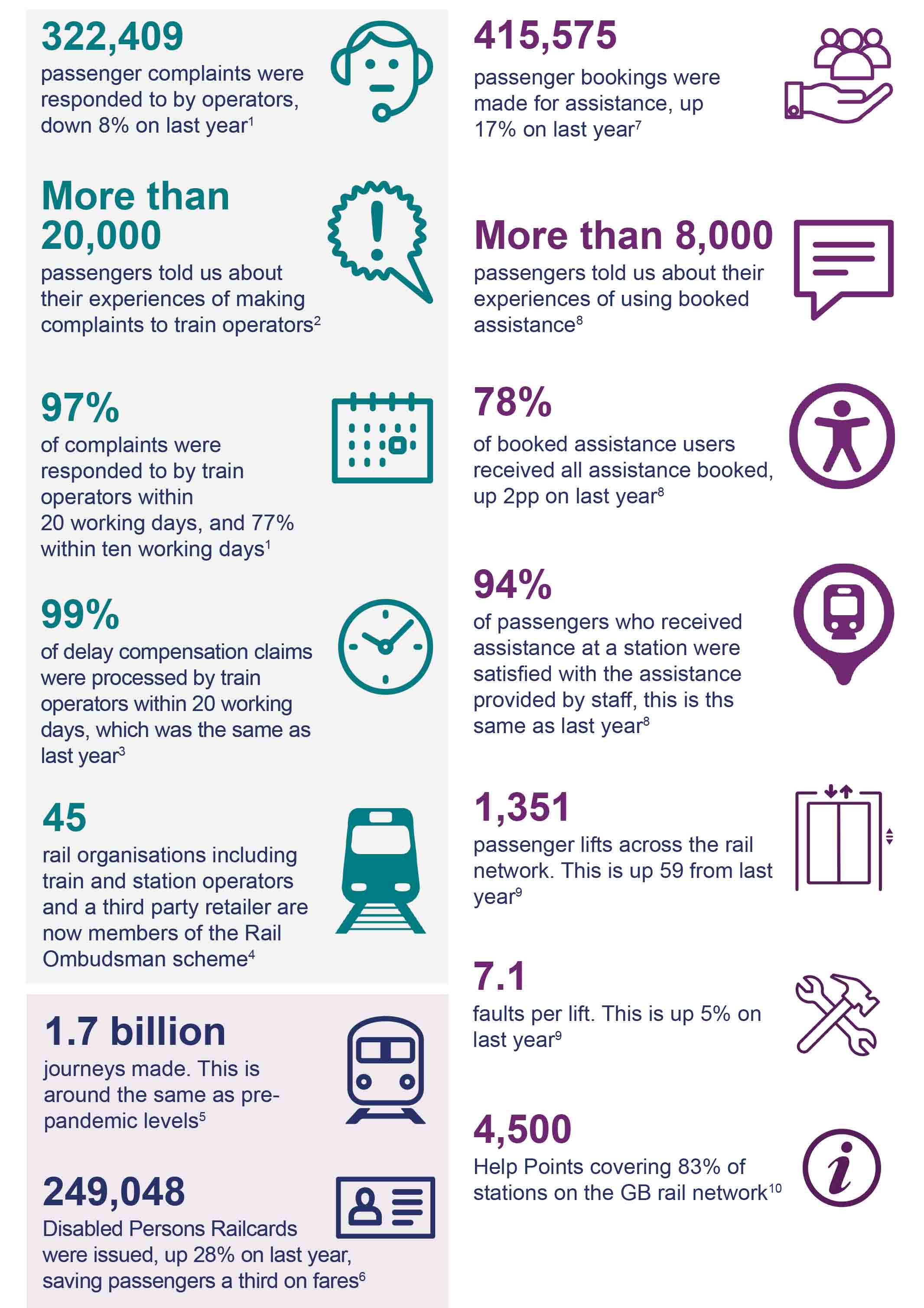Covering the period from 1 April 2024 to 31 March 2025

Executive summary
Passengers across Great Britain made 1.7 billion journeys by rail this year, an increase of 7% on last year. For every journey, we want travellers to feel confident about the experience they can expect. This report highlights our key interventions to protect passengers during 2024 to 2025 and our forward plan.
Purchasing train tickets and revenue protection practices
Passengers have significant choice over where to buy their train tickets, and which type of ticket to buy for their journey. They need to be provided with clear and accurate information to enable them to make the best decisions for them.
Building on work started last year, we secured increased transparency for passengers on fees charged by some retailers when rail tickets are purchased through websites and apps. All eight retailers that we engaged with made changes that addressed our concerns.
Separately, in November, a number of concerns came to light on train operators’ revenue protection practices and as a result the Secretary of State for Transport asked ORR to urgently review this matter, including the use of penalty fares and prosecutions. The overriding priority in doing so was to ensure that fare evasion was being addressed, but in a way that was fair to passengers and in line with the correct procedures.
As part of this review we considered whether ticket terms and conditions are clear and communicated effectively. Our report found that current revenue protection practices in rail are not working as well as they need to and require improvement in the interests of passengers, the rail industry and taxpayers. We have identified key areas for improvement and have made targeted recommendations that will address these issues.
The next step is for the Secretary of State and Department for Transport (DfT) to consider the recommendations and how (and the extent to which) these should be implemented. While our role is now complete, we stand ready to support this in any way we can.
Related to this we will finalise our review of the existing industry code of practice on the provision of key information to passengers on rail tickets and services, including its status and scope. This Code was developed to support rail ticket retailers in understanding the requirements of consumer law and to share the best practice that we have observed in this area.
Enabling disabled people to access travel by rail
Our rail network should be accessible to all, and this year we have seen a 17% increase in the number of bookings for passenger assistance.
Our passenger research suggests that satisfaction with assistance where it is delivered is high, but that service reliability has remained largely static at industry level and needs to improve.
Northern Trains was the poorest performer in our passenger research last year for the reliability of assistance provision. We requested an improvement plan to address this and have closely monitored its implementation. Northern committed to delivering a wide range of actions designed to deliver improvements for passengers. They have made good progress and, over the year ahead, our focus will shift to monitoring the realisation of benefits for passengers.
To help drive improvements across the wider industry, we consulted on a new framework for benchmarking operators’ performance in delivering assistance. We have amended our framework in response to consultation feedback. We will use quantitative data to assess operators’ delivery of assistance, and will qualitatively assess the capability improvements of the poorest performers. We will be publishing our first benchmarking report in the Autumn.
This year, we have also reviewed industry performance in key areas that contribute to the passenger experience of assistance.
We reviewed the reliability of help points at stations and found that passengers cannot consistently rely on help points to get the information and help they may need. We asked station operators to review their approaches to monitoring the availability of help points, and they have reported to us a range of positive steps being taken to improve help point reliability.
We also reviewed the communications between staff at boarding and destination stations, drawing on learnings from five busy stations. We identified opportunities for operators to reduce risks in the handover of key passenger information between stations through use of an electronic, rather than phone, handover. We are asking operators of the stations that deliver the largest volumes of assistance to review their approach to this handover process and submit conclusions, and any proposals for change, to us.
Separately we have started to publish biannual data on the reliability of passenger lifts at stations. Network Rail recognises the need to improve how it identifies, communicates and rectifies lift faults and has shared an improvement plan with us. We will continue to monitor its progress closely.
Finally, to support improvements in the complaints and redress processes for disabled passengers, we have shared the steps taken by five operators whose disabled passengers reported the highest barriers to engaging with complaints processes; and launched a consultation that proposes to require all operators to determine redress claims for failed passenger assistance on a case-by-case basis, recognising the varying circumstances and impacts for passengers when passenger assistance is not delivered as requested.
Protecting passengers when services are disrupted
Passengers’ journeys may be disrupted by engineering work needed to maintain the network, or by unplanned challenges such as extreme weather, staff availability, or infrastructure issues.
This year we have reassessed passenger information where rail replacement services are in place for planned engineering works. The industry has made some positive progress following the recommendations we made in our report last year. We also identified some areas where further focus is needed, particularly in relation to the information provided during the journey itself. We have made some further recommendations to industry and are continuing to provide bilateral feedback to operators.
We brought over 70 leaders from industry together to discuss passenger safety and welfare in stranded train incidents, informed by research that we commissioned jointly with Transport Focus. We have now set out some clear objectives for the industry to deliver collaboratively and will be reconvening with the industry in the Autumn to maintain momentum.
Throughout the year, we have continued to engage with the industry’s Smarter Information Smarter Journeys (SISJ) programme that enables cross-industry improvements in passenger information.
ORR sponsorship of the Rail Ombudsman
The Rail Ombudsman provides an independent service for resolving complaints where passengers are not satisfied with an operator’s response.
We sponsor the Rail Ombudsman and have continued to hold it to account for effective delivery of its contractual requirements.
We have agreed a continuous improvement plan with the Ombudsman based on the results of ORR commissioned research looking at awareness, perception and accessibility of the service. As a result, the Rail Ombudsman has committed to improving passenger and train operator user experience of the service and has recently introduced a new website and case management system.
Other improvements include: the transition from text phone to Relay UK; the introduction of a new WhatsApp channel; and targeted engagement and signposting of the service with vulnerable and lower awareness groups.
Infographic: Key figures
Covering the period from April 2024 to March 2025. Percentage point differences reflect a comparison with the previous year.

Infographic sources:
- ORR Passenger rail service complaints statistical release
- ORR Passenger satisfaction with complaint handling survey
- ORR Delay compensation claims
- Rail Ombudsman: Participating Service Providers
- ORR Passenger rail usage statistical release
- ORR Disabled Persons Railcards factsheet
- ORR Passenger assistance factsheet
- ORR Passenger Assist User Experience Survey
- ORR Passenger lifts at stations factsheet
- ORR Reliability of help points at stations report
Note: pp = percentage points

